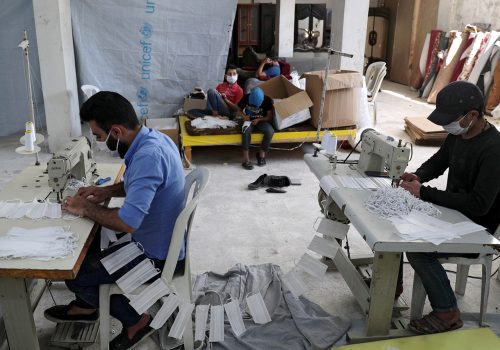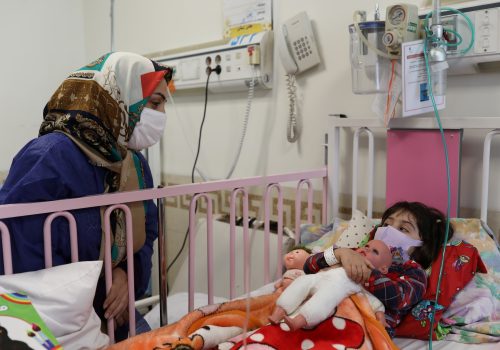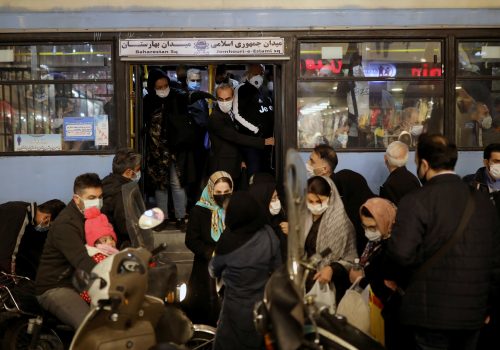Iran’s botched handling of the coronavirus may impact June election
Iran’s fight against the coronavirus pandemic has been riddled with turbulence since the outbreak began in February 2020. Entering its fourth wave, the country, which has the highest rate of COVID-19 deaths and cases in the Middle East, continues to experience a surge of infections under difficult circumstances. This is partly due to US sanctions but also because of the Iranian government’s mismanagement and corruption, which in turn could influence and further depress voter turnout in the June presidential election.
Mishandling began from the start, as Iranian officials prioritized 2020 parliamentary elections over public safety after waiting too long to stop direct flights from China. Internal squabbles since then have hindered Iran from effectively suppressing COVID-19, with health officials calling for stricter lockdowns while some politicians and clerics have insisted on keeping the sanctions-strained economy and communal houses of worship open.
There has also been criticism of the government for allowing a handful of companies to obtain licenses and a favorable currency exchange rate (42,000 rials = $1 compared to a market rate of 250,000 rials = $1) to import Personal Protection Equipment (PPE). Many used the opportunity to import other goods or faulty PPE to make more money. Hamidreza Rahmati, an Iranian manufacturer of face masks, exposed non-standard low-quality imported masks in an interview with Gostaresh News in October 2020. Nassrollah Pezhmanfar, chairman of a parliamentary committee that deals with government criticism, pointed out in a November 10, 2020 press conference that 30 percent—equivalent to $32 billion—of foreign funds ear-marked for import of necessary goods during the current Iranian year—beginning in March 2020—had vanished in the hands of, what he called, “the mafia.”
Mahmoud Najafi Arab, head of the Health Economics Commission at the Tehran Chamber of Commerce, Industries, Mines, and Agriculture announced on January 24, 2021 that $2.5 billion would be set aside in the next Iranian year (March 21, 2021 to March 20, 2022) for importing medicine and medical equipment. He did not specify how much would go toward COVID-19 vaccines.
The United Nations Office on Drugs and Crime has warned of corruption risks related to manufacturing, allocation, and distribution of COVID-19 vaccines around the globe. Given that Iran ranks 149 out of 180 countries on Transparency International’s 2020 Corruption Perception Index, Iranian citizens have ample reason to be suspicious about COVID-19 vaccination plans in their country.
Public discontent over the slow vaccine rollout in Iran has grown after the death of two prominent soccer players from COVID-19. Some Iranians on social media facetiously dubbed them “vaccine martyrs, ”co-opting the revolutionary language of the establishment, with one former soccer star, Sohrab Bakhtiyarizadeh, saying via his Instagram: “This isn’t about the expensiveness of gasoline anymore, where you answered the people with bullets. An approved vaccine is the right of the people.”
Meanwhile, there has been no clarity on whether vaccination will be free.
On January 19 2021, in a meeting with various government bodies, including the Central Bank of Iran and the Ministry of Health, President Hassan Rouhani stated that “despite all the obstacles and restrictions [imposed by the US], the necessary measures have been taken to purchase the [COVID-19] vaccine and the first shipment, which is approved by the health ministry, will enter the country in the coming weeks.” By February, Iran had imported four hundred thousand doses of the Russian Sputnik V vaccine. Iran has also begun the development of its own vaccine. On January 21, Mostafa Ghanei and Minoo Mohrez of Iran’s National Coronavirus Task Force said that the Iranian vaccine would be ready for mass distribution by mid-June. In March, a homegrown vaccine was said to have reached the phase of clinical trials, although details about its production have remained obscure.
Subscribe for more from IranSource
Sign up for the IranSource newsletter, which provides a holistic look at Iran’s internal dynamics, global and regional policies, and posture through unique analysis of current events and long-term, strategic issues related to Iran.
The vaccination process has been further delayed by the Supreme Leader’s ban on American and British-made vaccines. The government’s insistence on the use of domestic vaccines or vaccines produced in non-Western countries have increased popular anxiety about the safety and efficacy of the vaccination program.
Since 1979, Iranians have grown accustomed to living under pressure—from a devastating eight-year war with Iraq during the 1980s to decades of sanctions and cutthroat political infighting. Strained by US sanctions and domestic mismanagement and corruption, Iranians are experiencing increased anxiety about their very survival. From 2018 through 2020 prior to the pandemic, the Iranian economy contracted by nearly 12 percent. Per capita real income dropped by 14 percent and the country’s oil exports fell by 80 percent from 2.8 million barrels per day (bpd) in 2018 to 300,000 bpd in 2020. Food prices have tripled, the average living standard has plummeted by 13 percent, and the absolute poverty rate has risen by 11 percent, according to a Households Income and Expenditure Survey.
Given the economic uncertainty, unrest in the upcoming election season is possible. An excessive vaccination fee, rumors of nepotism as the vaccination programs roll out, black market distribution of vaccines, or distribution of fake vaccines could ignite a wildfire—especially under current circumstances.
Other Iranians are likely to boycott the June ballot, having become disillusioned with the reformist-pragmatist camp and the system overall. Additionally, with the virus still raging, many may choose to stay away to avoid the sort of spike in infections that accompanied the February 2020 parliamentary vote.
In recent years, protests have increasingly been focused on economic hardship rather than political and social reforms. The pandemic has already taken tens of thousands of Iranian lives and may be a breaking point for a society on edge.
Masoud Mostajabi is an associate director at the Atlantic Council’s Middle East Programs. Follow him on Twitter @MMostajabi1.
Image: (3/15/2021) Dr. Mehrnaz Rasoulinejad (C) , infectious disease specialist, who volunteered to receive the Barekat vaccine to begin phase 2 and 3 of its clinical trial. (Photo by Sobhan Farajvan/Pacific Press/Sipa USA)No Use Germany.


